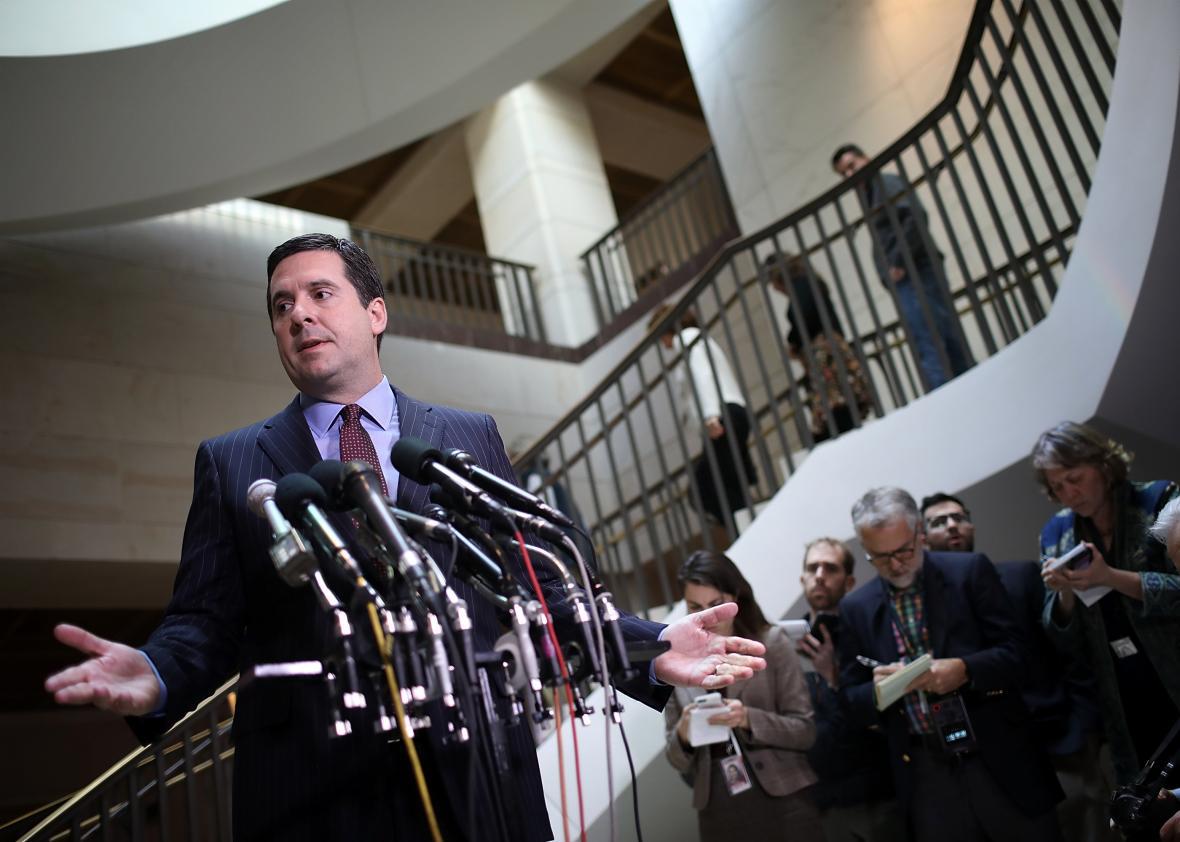Republican Rep. Devin Nunes, chairman of the House Intelligence Committee, made a somewhat confusing statement to reporters on Capitol Hill on Wednesday afternoon, the headline being that communications by the Trump campaign were “incidentally” monitored by the intelligence community. But beyond that, a lot of things are unclear. Here’s what Nunes said:
First, I recently confirmed that on numerous occasions, the intelligence community incidentally collected information about U.S. citizens involved in the Trump transition.
Details about U.S. persons associated with the incoming administration, details with little or no apparent foreign intelligence value, were widely disseminated in intelligence community reporting.
Third, I have confirmed that additional names of Trump transition team members were unmasked.
Fourth and finally, I want to be clear. None of this surveillance was related to Russia, or the investigation of Russian activities or of the Trump team.
Nunes initially said “yes,” when asked by a reporter if President Trump’s own communications were part of that surveillance, but when he was asked that same question again later, he said “it’s possible.” Elaborating but not clarifying, Nunes said, ”I know there was incidental collection regarding the president-elect and his team. I don’t know if it was physically a phone call.” He said he could not say if the communications had taken place in Trump Tower.
Nunes said that the information was collected in November, December, and January—the transition period after the election. He said he had seen “dozens” of reports involving Trump and his team, which were brought to his attention by a concerned but unidentified party. The information was collected, according to Nunes, as part of “normal foreign surveillance” and not related to any criminal investigation. “I believe it was all done legally,” he said. While he said repeatedly that the surveillance had nothing to do with the investigation of ties between the Trump campaign and Russia, he wouldn’t say what countries were involved.
Nunes was asked point blank, “Do you think right now that the NSA or a member of the intelligence community was spying on Trump during the transition period?”
He replied, “Well, I guess it all depends on one’s definitions of spying.“ (Nunes is fond of suggesting that definable words are open to interpretation.) He declared himself “alarmed” by what he had learned and is demanding more information from intelligence agencies. He said he was headed to the White House later Wednesday to brief the administration.
There was some master-level word salad–speak going on here. Nunes may be intimating that Trump and his team were victims of “reverse targeting,” in which surveillance of foreigners is used as a pretext for the surveillance of Americans. Intelligence agencies like the NSA and CIA are prohibited by law from spying on Americans but can collect “incidental information” if those Americans are in communication with foreigners. Reverse targeting is illegal, but privacy advocates, including Edward Snowden, say the law provides a loophole for it to continue. Sen. Rand Paul recently brought up reverse targeting when asked on Face the Nation about President Trump’s claims that President Obama had tapped his phones. To be clear: Nunes’ statement definitely did not confirm that this was going on.
Nunes is also suggesting that names of Trump associates collected in this surveillance were improperly “unmasked” and information about their activities shared within the intelligence community. He had previously raised this concern over the information that led to the discovery that former National Security Adviser Michael Flynn had been in touch with the Russian ambassador, but that apparently has nothing to do with the surveillance he’s talking about now. It’s also not really clear what “normal” surveillance is, or what was being investigated here if it wasn’t Russia.
The Democrats on the committee, including ranking member Adam Schiff, were apparently unaware of the evidence Nunes was citing. Democrats are also criticizing Nunes for briefing the White House on his findings:
Nunes’ statement is extremely frustrating. Trump’s defenders would love to shift attention from the Russia investigation to claims that Trump was under improper surveillance, and these vague remarks give them just enough ammunition to keep the claim going, without any way of assessing if this surveillance was actually improper or not. Press secretary Sean Spicer read from Nunes’ statement during his press briefing Wednesday and Trump told reporters Wednesday that he feels “somewhat” vindicated by Nunes’ comments.
I don’t know why he would. What Nunes definitively did not say was that President Obama had ordered Trump’s phones tapped, which, it bears repeating, is the only logical way of interpreting the president’s claim.
